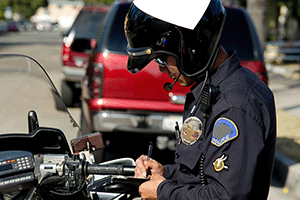Michigan Traffic Tickets
How to Run a Michigan Traffic Ticket Lookup
Michigan driving laws and penalties can be quite stringent. According to the state, around 40 million speeding citations are handed out every year, and that's just speeding tickets. Because of this there is a high demand for people wanting to lookup Michigan traffic tickets. This might be to find out about how to pay their traffic fines, or how to fight these in court. Whatever the reason, there is a very high demand for this information.
This article aims to shed light on Michigan traffic tickets. We will highlight the most common types of tickets issued in the state, and what to do if you get one. We will also discuss how traffic citations are considered criminal records. This is an important aspect of moving violations that many drivers may not be aware of. To begin a Michigan traffic ticket lookup you will need one of the following; the full name of the person that received the citation, their citation number, or the issuing law enforcement agency.
Various Ways to Search Michigan Traffic Citations
To find information about a specific citation, you can perform a Michigan traffic ticket search online. This can be done through the state's District Court Case Search. The first step is to register, and provide some basic information such as name, date of birth, and driver's license number. Results will include details about the traffic citation, fines, court information, and payment deadlines. You can also use this system to pay Michigan ticket online.
Another option that is useful is to lookup traffic tickets using third-party resources. These can include public record databases that allow users to locate traffic citations by name, as well as run a driver record abstracts. These are useful if you are looking for more comprehensive information about someone's driver history.
The Most Common Michigan Traffic Tickets
Traffic tickets are a common occurrence, with tens of millions handed out every year. They serve as a deterrent for drivers, in an effort to get drivers to obey traffic laws. Here are the most common traffic tickets give out in the state.
1). The most common traffic ticket issued in Michigan is for speeding. This violation happens when someone is going too fast, and exceeds the posted road speed limit.
2). The second most frequent driving violation is running a red light or a stop sign. This is a somewhat serious offense that can potentially lead to accidents.
3). Distracted driving is also a fairly common offense for MI traffic tickets. This can include driving and texting, talking on the phone without it being handsfree. Any type of behavior that appears to be distracting can lead to a violation, it's up to the discretion of law enforcement.
4). Driving without a valid, suspended, drivers license, or an expired one. This can lead to a suspension or further suspension of your driving privileges, and impound of your vehicle.
5). Drunk driving, or driving under the influence (DUI) is a very serious offense in Michigan. It carries steep penalties, community service and potential jail time. If someone is injured in this situation, a felony can be imposed.
6). Failure to yield to another driver, or pedestrian can lead to a citation. This happens more frequently intersections or when merging on highways or freeways.
7). Not signaling when changing lanes, is also a frequent violation. This can be dangerous, especially on highways. It's not a very common citation but when appropriate, the police will pull someone over for this.
Traffic Citations Are Considered Criminal Records
Traffic citations can most certainly considered criminal records. While most are infractions, some can lead to a misdemeanors or felony, which can lead to a person being incarcerated. Minor offenses, such as speeding or red light tickets, are mostly classified as civil infractions. These are still criminal records but nothing serious.
The more serious offenses, like driving under the influence, or reckless driving, can lead to misdemeanors or felonies. These violations will have larger consequences. They will also show up on a background check in someone's criminal history.
Having traffic violation on your criminal record can have long term consequences. It can limit employment opportunities and greatly increase auto insurance premiums. While most violations do not lead to jail time, they still lead to arrests, and have an impact on a person's livelihood.

Driving Point System Explained
Michigan uses a point system to track a driver's moving violations. Each violation is assigned a certain number of points, and there are limitations on how many someone can have before penalties are imposed. These points accumulate on a person's driving record. While many of these drop off after a couple of years, some stay on longer. Traffic School is also an option to remove The more severe the violation, the more points you receive. Some citations allow for a Driver Improvement School to be completed to have it removed from a person's visible driver record.
Here is an overview of the Michigan Points System:
1). Speeding 2 points
2). Running a red light: 3 points
3). Reckless driving: 6 points
4). DUI: 6 points
Contesting a Traffic Ticket in Michigan: A Step-by-Step Guide
If you believe your traffic ticket was unjustly issued, you can contest it in court. Remember, contesting a ticket can be a complex process. It's important to understand the laws and procedures involved. If you're unsure, consider seeking legal advice. Here's an easy to follow guide on how to do this.
1). Plead Not Guilty: The initial step is to plead not guilty to the traffic violation. This can be facilitated at the arraignment, or by mail with your violation.
2). Request a Court Hearing: Next is to to request a court hearing in front of a judge. You can often make this request online, or by mailing in your ticket. If you have difficulty figuring out how to do this, you can contact the clerk of the county courthouse.
3). Prepare Your Case: Gather all necessary information and documentation. This might include photos, witness statements, or dashcam footage if you have it.
4). Attend Your Hearing: At the hearing, you'll present your case. You can do this yourself or have a lawyer represent you.
5). Wait for the Verdict: After the hearing, the judge will make a decision. If you're found not guilty, the ticket will be dismissed. If you're found guilty, you'll need to pay the fine and accept any additional penalties.
How Do I Lookup Someone's Michigan DUI?
A quick and easy way to lookup someone's DUI and DWI and traffic citations, is to use a public records website. Since all of these moving violations are considered public records, anyone can search for these online with a simple name search.
How Can I Find my Michigan Traffic Ticket?
There are a couple of easy ways to lookup traffic citations in Michigan. First, you can use the Michigan eCourts website to lookup your traffic ticket by citation number, name, driver's licesne number or license plate number. You can also lookup all of your traffic citations and DUIs using a public records website. Using this second option also allows you to lookup other peoples traffic citations and DUIs anonymously.
The Consequences of Ignoring a Traffic Ticket
Ignoring a Michigan traffic ticket can lead to severe consequences A failure to respond to a ticket can also result in a default court judgment. This means the court can find you guilty without a hearing. Additionally, an unresolved ticket can lead to license suspension. This can severely impact your ability to commute or travel, and your auto insurance carrier might drop you. Thirdly, additional fines may be imposed. These are often significantly higher than the original ticket fine. Lastly, in extreme cases, an arrest warrant may be issued. This is particularly true for serious offenses such as DUIs, or repeated moving violations.

